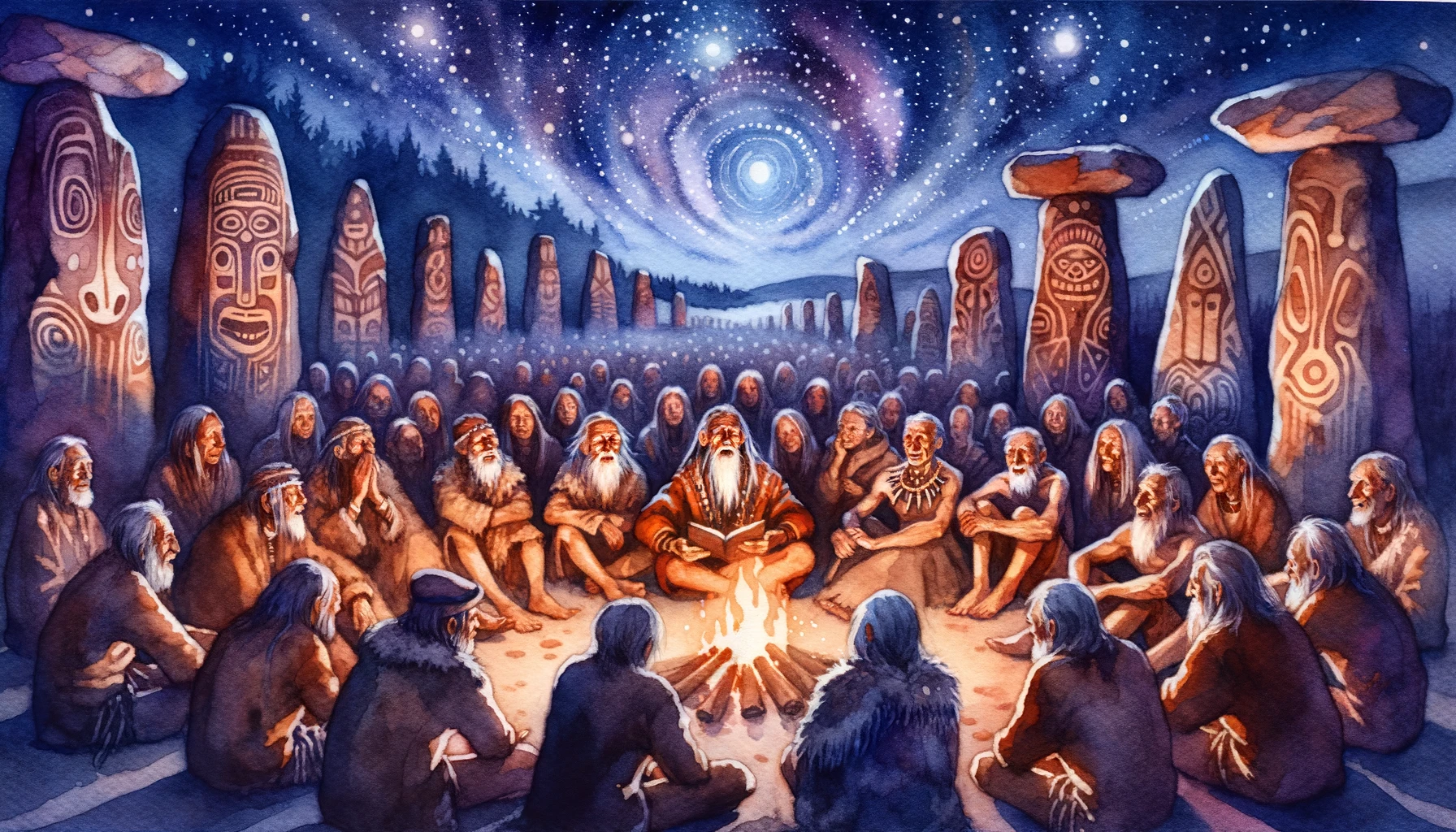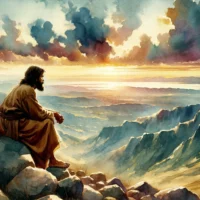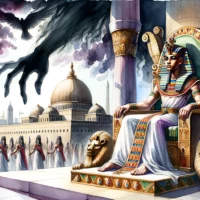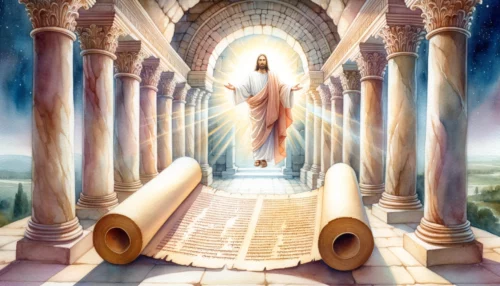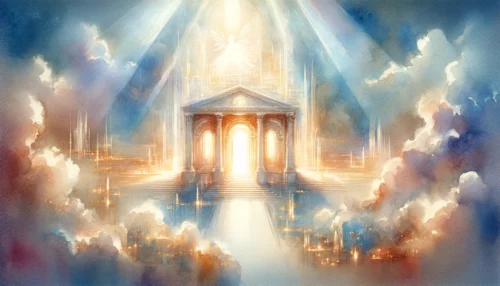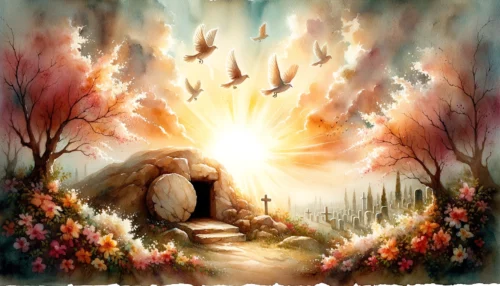In the dawn of history, before the Bible was meticulously compiled and transcribed, how did mankind come to know of God? The question sparks intrigue, curiosity, and perhaps even a touch of skepticism. Yet, it is essential to examine, not to question the authority of Scripture, but to comprehend the magnificence of God’s revelation throughout human history.
God’s Direct Revelation: The Early Days
At the outset of human history, the relationship between God and His creation was unmediated and direct. It’s depicted as personal interaction between the Creator and humanity. Adam and Eve walked with God in the garden of Eden, a clear indication of direct divine communication (Genesis 2-3). This direct interaction didn’t cease with their expulsion from the garden, God spoke to Cain concerning his anger and sin (Genesis 4), and He also spoke directly to Noah, instructing him to build an ark (Genesis 6-9).
Among the early descendants of Adam, there were also those who ‘called on the name of the Lord’ (Genesis 4:26). This suggests an acknowledgment of and a relationship with God that existed outside the immediate family of Adam and Eve. It implies a knowledge of God’s existence and character, likely communicated through oral tradition and direct revelation.
Even as human history advanced, God continued to speak directly to individuals. For example, God called Abraham out of his homeland and promised to make him a great nation (Genesis 12). This direct interaction with Abraham marked the beginning of a covenant relationship with a particular line of humanity, a covenant that shapes the trajectory of the biblical narrative and reveals God’s plan for humanity.
God also interacted directly with the patriarchs of Israel. He appeared to Isaac to reaffirm the covenant promise (Genesis 26). Jacob also had encounters with God, most notably in a dream where God confirmed the Abrahamic covenant with him (Genesis 28). God’s communication was not limited to the patriarchs alone; He also spoke to women like Hagar, Sarah’s maid, giving her hope and direction in her distress (Genesis 16).
The point to stress here is that God desired communication with humanity, a theme that runs like a golden thread throughout biblical history. This communication happened in various ways: dreams, visions, a still small voice, an audible voice, a burning bush, and even a donkey had been God’s mouthpiece on one occasion (Numbers 22:28). In these varied interactions, God demonstrated His sovereignty, holiness, and compassion, fostering an understanding of His character and will among His people.
God’s interaction was not confined within the geographical or ethnic boundaries. He spoke to Abimelek, the Philistine king, in a dream, warning him about Sarah (Genesis 20). Even to the foreign prophet Balaam, God communicated His will (Numbers 22-24).
The early history of humanity as depicted in the biblical narrative is rich with instances of God’s direct revelation. The communication was unmediated, personal, and cut across gender, social, and ethnic lines. God’s interactions ranged from verbal dialogue, dreams, and visions to more dramatic encounters. He offered guidance, delivered warnings, established covenants, and revealed His character and plans, fostering an understanding of Himself among people. Such divine revelations testify to God’s persistent desire to communicate with His creation.
The Role of Prophets and Messengers
When considering the transmission of knowledge about God before the Bible, prophets hold a crucial place. A prophet, by definition, is someone appointed by God to convey His messages. This makes prophets an instrumental link between God and His people.
Beginning with Abraham, whom God described as a prophet (Genesis 20:7), the chain of prophetic communication continued unbroken for centuries. Moses, an undeniable cornerstone in this tradition, stood as a significant intermediary between God and His people (Exodus 3-14). God spoke to him ‘face to face, as a man speaks with his friend’ (Exodus 33:11). Through Moses, God gave the Ten Commandments, thus setting moral and ethical standards for His people (Exodus 20).
This role of prophets wasn’t confined to communication alone; they often demonstrated God’s power and authority. Elijah, for instance, displayed God’s supremacy on Mount Carmel in a dramatic showdown with the prophets of Baal (1 Kings 18). Through acts like these, people learned about God’s power, His intolerance of idolatry, and His unwavering loyalty to those who follow Him.
Throughout the generations, prophets like Samuel, Isaiah, Jeremiah, and Ezekiel played vital roles in communicating God’s messages. They spoke of judgment and mercy, of rebellion and restoration. They envisioned a future Messiah, contributing to the messianic expectation that would culminate in Jesus Christ (Isaiah 53, Jeremiah 23:5).
God also communicated His will and plans through female prophets. Women like Deborah, Huldah, and Miriam were chosen to relay God’s messages, proving that God’s communication wasn’t gender-biased (Judges 4, 2 Kings 22:14, Exodus 15:20).
There were also messengers or angels, heavenly beings, carrying God’s messages to people. Angels announced the birth of Isaac to Abraham (Genesis 18), guided Hagar in the wilderness (Genesis 21:17), and visited Daniel with interpretation of his visions (Daniel 9:21).
Despite the cultural, historical, and societal contexts these prophets and messengers found themselves in, their message remained consistent – a testament to the unchanging character of God. Through their words and actions, they painted a picture of God as a just judge, a compassionate father, a deliverer, and a covenant-keeper.
Prophets served as the mouthpieces of God, delivering His messages to His people. From the time of Abraham to the major and minor prophets of Israel, these chosen individuals relayed divine laws, announced judgements, expressed God’s mercy, and prophesied about a future Messiah. They often demonstrated God’s power, showing His supremacy. The messages of these prophets, consistent across time and culture, highlighted God’s unchanging character. Alongside them, angels played a significant role, often intervening in critical moments to deliver God’s messages and guide individuals.
The Light of Nature: Witnessing God in the World Around Us
One aspect of revelation that often goes unnoticed is the display of God’s glory in nature. This concept, also known as general or natural revelation, suggests that God’s existence and attributes can be perceived through observing the world around us. It does not require direct verbal communication or prophetic visions; instead, it involves a keen observation of the natural world and the realization that such magnificence and order could not occur by chance.
The first chapter of Genesis portrays the creation of the world, where God brings forth life and order out of chaos. Each stage of creation, whether it’s the creation of light, the separation of water and sky, the emergence of land and plants, or the creation of the sun, moon, stars, and various forms of life, all display a creative power and wisdom that point towards a Creator (Genesis 1). This is a silent testimony, an open book for all humanity to read, regardless of time, culture, or language.
The Psalmist captures this concept beautifully when he writes that ‘The heavens declare the glory of God; the skies proclaim the work of His hands’ (Psalm 19:1). The celestial bodies, with their precision, predictability, and splendor, tell a story of a grand designer. Similarly, the harmony and balance observed in the natural world, the changing seasons, the life-giving rain, the diversity of flora and fauna, all whisper tales of an intelligent and benevolent sustainer.
Such a witness from nature also extends to the human conscience, an inner moral compass that seems to exist in every individual across different societies and cultures. Paul, in his letter to the Romans, speaks about people who do not have the law (the written Word of God) but who by nature do what the law requires, being a law to themselves. He suggests that their conscience bears witness to this law, pointing towards a moral law-giver (Romans 2:14-15).
But it is crucial to note that while nature and human conscience point towards a divine being, they do not provide a complete understanding of God, especially concerning His plan of redemption. They make humanity without excuse for not acknowledging a Creator (Romans 1:20), but they do not illuminate the path of salvation, which is revealed through Jesus Christ and attested in the written Word of God.
The natural world is a canvas where God’s glory is vividly displayed, offering silent yet compelling evidence of a Creator. This general or natural revelation can be seen in the order and magnificence of creation, and even in the human conscience that testifies to a moral order. While such revelation does not provide a comprehensive understanding of God’s redemptive plan, it leaves no room for denying the existence of a Creator. It is a universally accessible testament, inviting all humanity to seek the One who painted the skies, sculpted the mountains, and breathed life into being.
The Echo of Divine Revelation in History
The pathway to God’s revelation has been etched deeply throughout human history, long before the existence of the Bible. Through direct communication, the voice of prophets and messengers, and the silent testimony of nature, God made Himself known to humanity. These various forms of revelation paint a multifaceted portrait of God, testifying to His existence, character, and plans.
To continue reflecting on this topic, consider these questions:
- How do you see God’s character revealed in the natural world around you?
- How does knowing that God communicated with humanity before the Bible affect your understanding of God’s desire for a relationship with us?
- What can we learn from the ways in which God communicated with humanity in the times before the Bible?
In the dawn of creation, through the ages of prophets and kings, God was always speaking, always revealing Himself. His voice echoed through time and space, reached every corner of the earth, touched countless lives. Let us tune our hearts to this divine echo, finding in its resonance the call to know our Creator and the hope of His eternal plan. May this understanding inspire us to deepen our faith and seek God with all our hearts. For He is not far from each one of us, and in Him, we live and move and have our being.




